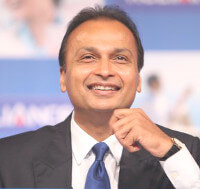
Anil Dhirubhai Ambani
Chairman
Reliance Group
The private sector is uniquely poised to fully participate in the potential of the new defence procurement procedure, writes Chairman of Reliance Group ANIL D AMBANI
The transformation of India's defence policy landscape over the last 18 months is a tribute to what outstanding teamwork can deliver, with Prime Minister Narendra Modi as the visionary, and defence minister Manohar Parrikar as his second-in-command.
The release of the defence procurement procedure (DPP) last week is a milestone in this journey. DPP breaks new ground with its emphasis on the Indigenously Designed, Developed and Manufactured (IDDM) platforms. It will boost domestic manufacturing and incentivise exports.
In moving away from the concept of lowest bidder (L1), DPP prioritises quality over cost in defence contracts.
The Idea of strategic partners is a huge positive although the plan to limit capable private players to one or two segments is a concern. It's like saying you can do petroleum but not petrochemicals or make iPhones but not the iOS.
Besides, how is a private sector monopoly any better than a public sector one? We must allow competition without any infra- or Inter-segment restrictions among the 10 segments identified for strategic partnerships. Open competition will lower costs, shake up the status quo, bring in new technologies and support the Skill India programme. This government has set new standards in transparency by auctioning natural resources. The same principle should apply to defence procurement.
In the last 22 months, the Defence Acquisition Council has met a record number of times and cleared proposals worth Rs. 2 lakh-crore. However, a majority of contracts are either repeat orders due to urgent force requirements or decided on nomination, while others fall under the category of foreign military sales or inter-governmental agreements. It is nobody's case that everything in defence is amenable to competitive bidding. But wherever nomination is unavoidable, clear guidelines are needed so that private players have better visibility regarding future opportunities. The practice of purchase-by-nomination must be an exception guided solely by national security imperatives.
The government is revisiting the blacklisting norms. While wilful wrongdoing deserves exemplary punishment, there's a need for fairness and proportion. Punishment must be limited to errant companies rather than an entire group. In first-time cases, financial penalties and compounding must be the preferred option. A calibrated approach is the right way forward.
Blanket blacklisting is a remedy worse than the disease. It not only limits technology options but also raises costs and creates monopolies. There's also the obvious danger here of inherent potential misuse by interested parties.
Under-utilisation remains a big challenge. We face a situation where public sector shipyards have an order book worth Rs.1.5 lakh-crore. And yet, in the past two years, their total annual production is barely Rs. 6,000 crore. At this rate, it would take more than 20 years or more to deliver on the current order book. This when the Indian Navy has an acquisition pipeline of Rs.3 lakh-crore over the next 15 years.
Meanwhile, private shipyards in India remain plagued by huge idle capacities. We need to make full use of these national assets to address our security needs and ensure sustainability of private investment. We fully respect the capabilities of our defence PSUs and would be happy to partner them. But they must be encouraged to outsource to private players far beyond the current practice of micro projects worth a handful of crores.
Despite a committed reformist mindset at the top, we are still seeing opportunities being denied to new players on grounds of lack of experience. This is the classic chicken-and-egg situation, where nobody wins. What is the key lesson of our reforms in sectors such as autos, telecom and IT? Had we applied the same restrictions in the early stages of development of these sectors, would we've achieved the successes we have?
No one will deny the importance of experience, but successful enterprise needs a lot more. From capability, competence and commitment to vision and risk-taking. My father, Padma Vibhushan Dhirubhai Ambani, was neither a chemical engineer nor a technologist nor indeed did he have any prior experience in the oil and gas sector. Yet, he created the largest petrochemicals company in the world. Clearly, there would have been no Reliance in existence today if experience was the sole defining yardstick of entrepreneurial success. Many of India's top companies today from Infosys to Wipro to Sun Pharma have been created by first-time entrepreneurs with little or no prior experience of the fields in which they went on to become global leaders.
At the recent DefExpo in Goa, Parrikar recalled how he had to repeatedly face the bogey of experience in his own political career but particularly so when he was being considered for the top job.
'So what's your experience of running a state?' This question was often raised by seniors. On one such occasion, an exasperated Parrikar retorted. "Sir, did you have any experience of marital life before you got married?" It's not without irony that Parrikar became one of Goa's most charismatic and successful chief ministers.
The moral is that experience is often a booby trap laid to ambush competition. India's private sector is today uniquely poised to mobilise resources, create capacities, acquire skill sets and forge joint ventures, thanks to the new liberal FDI regime. This will bring in the requisite experience that enables committed private players to fully participate in the promise and potential of DPP 2016.
The past 18 months have witnessed a wonderful marriage of leadership and vision at the top with sure-footed administrative and policy reforms on the ground.
It's time to aim higher. "We are kept from our goal,” says the Gita, "not by obstacles but by a clear path to a lesser goal.” Let the tailwind of competition take us to the greater goal.
* As told to Times of India, April, 06 2016